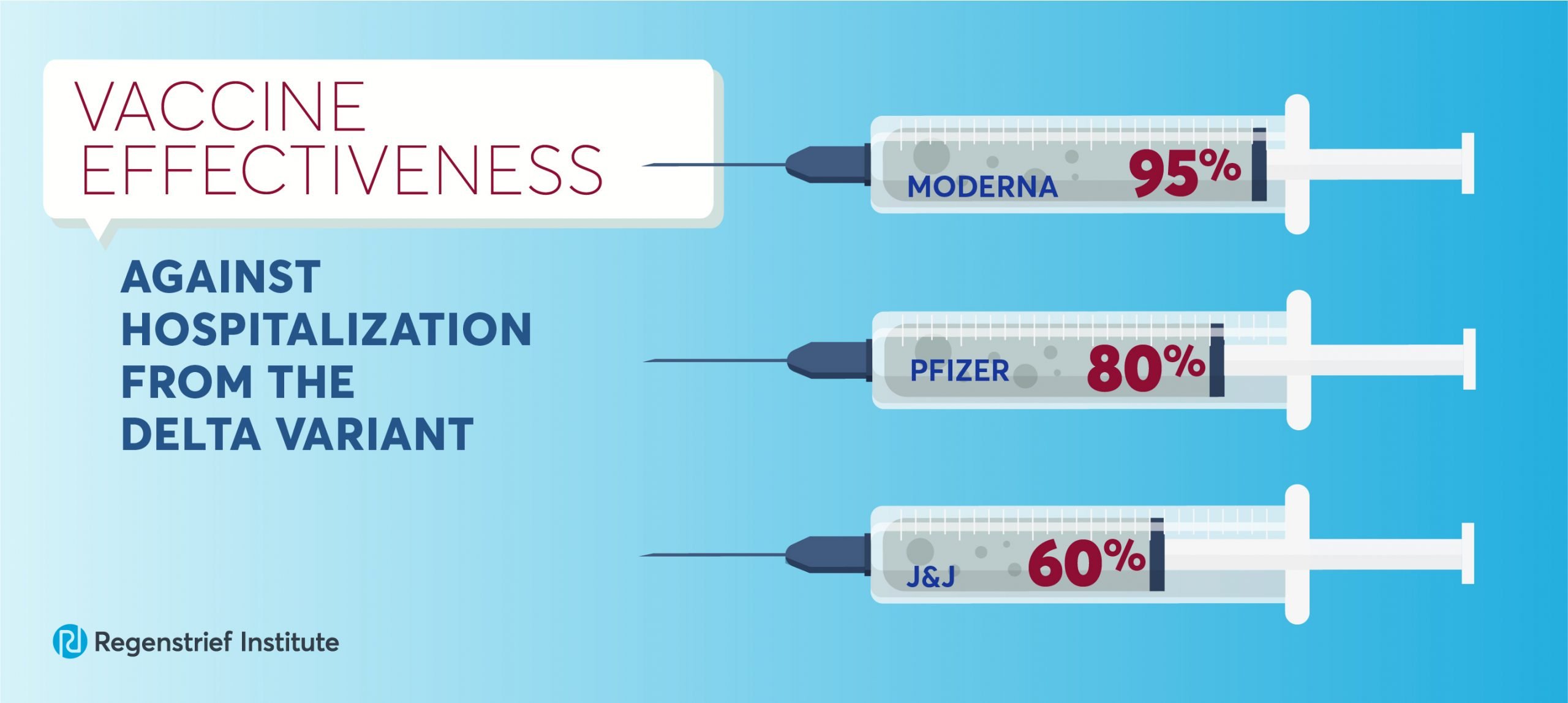COVID-19 vaccines are effective at preventing hospitalizations and emergency department visits caused by the Delta variant, according to data from a national study. That data also indicate that Moderna’s vaccine is significantly more effective against Delta than Pfizer and Johnson & Johnson.
“These real-world data show that vaccines remain highly effective at reducing COVID-19 related hospitalizations and emergency department visits, even in the presence of the new COVID-19 variant,” said study author Shaun Grannis, M.D., M.S., Regenstrief Institute vice president for data and analytics and professor of medicine at Indiana University School of Medicine. “We strongly recommend vaccinations for all who are eligible to reduce serious illness and ease the burden on our healthcare system.”
The Centers for Disease Control and Prevention (CDC)’s VISION Network analyzed more than 32,000 medical encounters from nine states during June, July and August 2021, when the Delta variant became the predominant strain. The results showed that unvaccinated individuals with COVID-19 are 5-7 times more likely to need emergency department care or hospitalization, similar to the overall effectiveness prior to the variant.
The study in Morbidity and Mortality Weekly Report is also the first analysis from the VISION Network to show a marked difference between the effectiveness of the mRNA vaccines (Moderna and Pfizer). In the study’s time period:
- Moderna was 95 percent effective at preventing hospitalizations among adults ages 18 and older.
- Pfizer was 80 percent effective at preventing hospitalizations among adults ages 18 and older.
- Johnson & Johnson was 60 percent effective at preventing hospitalizations among adults ages 18 and older.
The study also found that vaccine effectiveness is lower for people 75 years and older, which has not been shown in previous research. This could be due to a range of factors, including the increased time since vaccination.
When it came to preventing emergency department and urgent care visits, analysis showed that:
- Moderna was 92 percent effective.
- Pfizer was 77 percent effective.
- Johnson & Johnson was 65 percent effective.
Scientists say these findings need further monitoring and evaluation.
“Despite the differences in effectiveness, vaccines continue to offer much more protection than not getting one at all,” said Dr. Grannis. “While breakthrough cases do happen, data shows the symptoms are less severe. The vast majority of COVID hospitalizations and deaths continue to be among unvaccinated individuals. COVID-19 vaccines are powerful tools for combating the pandemic.”
The VISION network, funded by the CDC, includes seven organizations that contribute and analyze data from U.S. healthcare systems to learn more about the COVID-19 vaccine effectiveness. In addition to Regenstrief Institute, other members are Columbia University Irving Medical Center, HealthPartners, Intermountain Healthcare, Kaiser Permanente Northern California, Kaiser Permanente Northwest and University of Colorado.
“Interim Estimates of COVID-19 Vaccine Effectiveness Against COVID-19–Associated Emergency Department or Urgent Care Clinic Encounters and Hospitalizations Among Adults During SARS-CoV-2 B.1.617.2 (Delta) Variant Predominance — Nine States, June–August 2021” is published in the CDC’s Morbidity and Mortality Weekly Report. In addition to Dr. Grannis, other authors on the paper are Elizabeth A. Rowley, DrPH, M.S. of IU School of Medicine; Toan C. Ong, PhD of Kaiser Permanente Northwest; Edward Stenehjem, M.D., MSc of InterMountain Healthcare; Nicola P. Klein, M.D., PhD of Columbia University; Malini DeSilva, M.D. of HealthPartners; Allison Naleway, PhD of Kaiser Permanente Northwest; Karthik Natarajan, PhD of Columbia University and Mark G. Thompson of the CDC COVID-19 Response Team.
About Regenstrief Institute
Founded in 1969 in Indianapolis, the Regenstrief Institute is a local, national and global leader dedicated to a world where better information empowers people to end disease and realize true health. A key research partner to Indiana University, Regenstrief and its research scientists are responsible for a growing number of major healthcare innovations and studies. Examples range from the development of global health information technology standards that enable the use and interoperability of electronic health records to improving patient-physician communications, to creating models of care that inform practice and improve the lives of patients around the globe.
Sam Regenstrief, a nationally successful entrepreneur from Connersville, Indiana, founded the institute with the goal of making healthcare more efficient and accessible for everyone. His vision continues to guide the institute’s research mission.
About IU School of Medicine
IU School of Medicine is the largest medical school in the U.S. and is annually ranked among the top medical schools in the nation by U.S. News & World Report. The school offers high-quality medical education, access to leading medical research and rich campus life in nine Indiana cities, including rural and urban locations consistently recognized for livability.
Shaun Grannis, M.D., M.S.
In addition to his role as the vice president of data and analytics at Regenstrief Institute, Shaun Grannis, M.D., M.S., is the Regenstrief Chair in Medical Informatics and a professor of family medicine at Indiana University School of Medicine.








